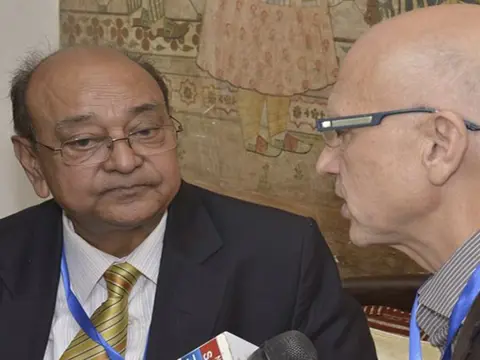
Syed Ziaur Rahman
Professor & Chairman, Department of Pharmacology
Jawaharlal Nehru Medical College Hospital
Aligarh Muslim University, India

Prof. Singhal passed away on 19 April 2025. He is survived by his wife, children, and a large community of pharmacology researchers who had the privilege of training under him.
Prof. Krishan Chandra Singhal was born on 16 June 1941 at Aligarh. Following his early education, Dr. Singhal pursued his BSc at Aligarh Muslim University before completing both his MBBS and MD in Pharmacology at King George Medical College, Lucknow. On his return to Aligarh, he joined the Department of Pharmacology at his alma mater as an assistant research officer and went on to become a Demonstrator, Lecturer, Reader, and eventually Professor at the department. He also served as the department chairman twice, from 1990 to 1996, and from 1999 to 2002. While serving the department, he completed a PhD (1976) from Sardar Patel Medical College, Bikaner, and a DSc (2001) from Aligarh Muslim University. After his retirement, he became the founder vice chancellor of NIMS University, Jaipur, from 2008 to 2015. His major areas of research were Pharmacovigilance, Clinical Pharmacology, and Chemotherapy.
Dr. Singhal was an early proponent of pharmacovigilance as it spread through India in the late 1960s. He was key to raising awareness of adverse drug reactions (ADRs) in the country, training young pharmacologists and health scientists in pharmacovigilance, and developing India’s first ADR monitoring system. He coordinated the first project on multi-centric monitoring of epidemiological profile and factors for ADRs in India for three years from 1989 to 1992 at the Department of Pharmacology in Aligarh Muslim University. The project resulted in the generation and submission of ADR reports for more than 58000 patients.

In 1997, India became a member of the World Health Organization (WHO) Programme for International Drug Monitoring, and Dr. Singhal was appointed as “Honorary Consultant to WHO-UMC, following an agreement between WHO and the Indian Drugs Controller General (DCGI), wherein it was decided to establish working relationships with Uppsala Monitoring Centre and pharmacovigilance centres in India. Dr. Singhal shared the expertise gained from this project at annual courses in Uppsala and translated the WHODrug dictionary into Hindi. He represented India in national centre meetings held by WHO all over the world.
Dr. Singhal founded and became the first president of the Society of Pharmacovigilance, India (SoPI) in 1999, which began to promote the study of the use and effects of drugs as well as monitor drug safety in the general population, and to establish a dialogue on pharmacovigilance as a distinct and influential clinical specialisation. SoPI was the first national professional society in the world after the European Society of Pharmacovigilance, which coincidentally became the International Society of Pharmacovigilance (ISoP) in the year SoPI began. For decades, ISoP and SoPI remained the only specialised pharmacovigilance societies in the world. Prof. Singhal actively participated in all the SoPI conferences annually and remained its patron till his death. He was a fellow of the Royal College of Physicians in Edinburgh, the Indian Pharmacological Society, the Indian Academy of Neuroscience, and the Society of Pharmacovigilance India. Dr. Singhal served as Treasurer for the Indian Pharmacological Society in 1982 and 1983, then was elected president of the society in 1992.
“The challenge now is to continue developing pharmacovigilance in ways that really work for each country – using the on-the-spot knowledge of professionals who really know and understand local populations. People and relationships are the keys to effective patient safety.”
Dr. Singhal made significant contributions to both pharmacovigilance research and academia throughout his career. His scholarly output was extensive, encompassing over 200 research publications in national and international scientific journals, along with more than 205 papers and lectures presented at conferences worldwide. His editorial leadership was equally notable—he served as Chief Editor of the Indian Journal of Pharmacology from 1989 to 1991 and later took on the role of Editor for the Pharmacology Section of the Indian Journal of Physiology and Pharmacology.
Dr. Singhal was the recipient of many prizes, oration awards, and honours. This included four awards from the Indian Pharmacological Society, three awards from the Indian Science Congress Association, including a Lifetime Achievement Award, the BC Sharma Memorial Research Award of the Indian Medical Association, the SS Parmar Foundation Award of the Indian Academy of Neuroscience, and the John Autian Oration of SoPI.
Aside from his many academic and societal roles, Dr. Singhal worked as a physician at the Dr. K. C. Singhal Hospital and Research Centre in Aligarh till his death. He will be fondly remembered by the countless patients and students whose lives he touched. His influence and contributions to pharmacology are commemorated with a gold medal in his memory, which is awarded to the top student in the MD Pharmacology examination in Pharmacology in Aligarh Muslim University, where he served till his retirement. The KC Singhal Oration serves as another tribute to his legacy, recognising eminent pharmacovigilance scientists, and is awarded during the annual meeting of SoPI (SoPICON).
Oman’s VigiMobile launch is more than a technical upgrade. It signals a strong commitment to patient safety and public participation in pharmacovigilance.
17 September 2025
How can we make healthcare safer for children? ISoP’s Angela Caro-Rojas shares insights ahead of World Patient Safety Day.
04 September 2025
Public health is at risk now more than ever; with AI it has never been easier to spread mis- and disinformation on health. How do we work smarter to address this threat?
17 June 2025